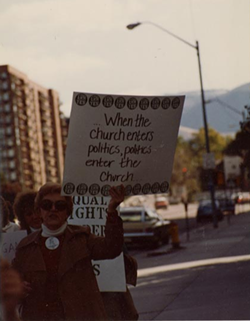Year
Editor's note: On Wednesday, Jan. 15, Virginia became the pivotal 38th state to ratify the Equal Rights Amendment.
"While the enactment or rejection of the Equal Rights Amendment must be accomplished by recognized political processes, we are convinced that because of its predictable results, the matter is basically a moral rather than a political issue; and because of our serious concern over these moral implications, we have spoken against ratification, and without equivocation do so again."
And they did. That quote was from Spencer W. Kimball, the 12th president of The Church of Jesus Christ of Latter-day Saints—in 1980.
Today? "The church's position on this issue has been consistent for more than 40 years," church spokesman Doug Andersen told The Salt Lake Tribune last month.
Related We Wish You an Equal Christmas: Group of renegade carolers take over Temple Square calling for ERA ratification.

Former U.S. Rep. Karen Shepherd, D-Utah, the state's quintessential feminist, agrees.
Nothing has changed. But that nothing is different.
"Here, we have a significant wage gap [in Utah, it is the same as it was 30 years ago] and women are grossly underrepresented in Congress and in all the legislatures in the nation," Shepherd says. "And our children are often simply uncared for because their parents work, child care is too expensive, and they have to fend for themselves."
Utah is in the unique position of becoming the 38th state to ratify the ERA, embedding this simple statement in the U.S. Constitution:
"Equality of rights under the law shall not be denied or abridged by the United States or by any state on account of sex."
Rep. Karen Kwan, D-Salt Lake City, is sponsoring House Joint Resolution 7, which would ratify the ERA, in this year's Legislature, and hoping against hope for a Senate Republican co-sponsor.
What are the odds? That depends, maybe on church influence. Utah Policy came out with a Y2 Analytics poll earlier this month that shows nearly three-quarters of Utahns favor passing the ERA. And 48% of them strongly favor ratification. That gives some cover to Mormon legislators, although there's that other factor—LDS influence.
Because of that, former Utah Sen. Steve Urquhart, R-St. George, thinks it's dead in the water. Take his nondiscrimination bill from 2013 and 2014. "There were representatives and senators who would have taken a bullet before they voted for that because of what their God wanted," Urquhart, a non-practicing Mormon who is a fierce critic of church political interference, says. "Then in 2015, their leadership told them to vote for it and they were elbowing each other out of the way—you saw the numbers." Indeed, it passed 65-10.
His bill covered fair practices in housing and employment based on gender identity and sexual orientation, and it was widely heralded nationwide as a "breakthrough in balancing rights and religious freedom," according to The New York Times. But the ERA? That's another thing altogether.
Oh, Gayle No!
Enter Gayle Ruzicka, let's call her Karen Shepherd's polar opposite. Ruzicka, as head of the Utah Eagle Forum, is a major force at the Legislature and probably the single greatest influencer of conservative morality behind the LDS church.
"Nothing has changed in terms of the ERA 40 years ago and today, and I don't want either of them," she tells City Weekly.
Back then, people were looking at the ERA, asking about it and waiting to hear from the LDS church. It was at church where Ruzicka first heard the name Phyllis Schlafly. She was instantly inspired, looked her up and determined to follow in her footsteps. In Utah, Ruzicka might have surpassed Schlafly in reputation and influence, and lawmakers are loath to defy her.
"The church speaks out on a lot of things—marijuana, conversion therapy, anti-discrimination," Ruzicka says. "But the ERA is not good for women absolutely and not good for unborn babies."
Last December, Utah ERA advocates rallied at the Capitol to announce Kwan's resolution. On the east steps behind them stood Ruzicka's minions in bright yellow T-shirts emblazoned with the words "Unborn Babies."
"We have just been notified that there will be a pro-ERA rally at the Capitol," they wrote in four-page list of talking points. "The U.S. House of Rep. has already passed a bill through the judiciary committee to repeal the ERA sunset ... This would be a huge threat to the roles of motherhood and the family."
So, here are the reasons they violently oppose the ERA, starting with, "This would lead to gender erasure":
• Harm to unborn children
• Harm to women
"It says men and women are exactly the same and we're not," Ruzicka says. "Men can't have babies. What about children in the home? One parent or another stays home with the children. I still get to share in my husband's Social Security. If I couldn't, then all my years staying at home with the children, I'd end up with nothing.
"What about the draft? If we go to war, if they can draft women, it's putting them on the front lines ... How would it be to have women on the front lines? It's the nature of men to be protective of women.
"Motherhood needs some protection. Children need some protection."
Of course, abortion is the overriding issue here—that, and a future of mandated same-sex bathrooms. Workplace accommodations for pregnant and nursing women would be overturned as would state labor laws that protect women who do heavy, manual work, the Eagle Forum says.
There are lots of other things that would happen if the ERA passes, she says, because it "says men and women are exactly the same. There's nothing in federal law that says men and women are exactly the same."
But that's not really what it's about. Equality is defined in the Oxford Dictionary as "the state of being equal, especially in status, rights, and opportunities." The question is whether equal rights would force someone to do exactly what someone else is doing.
"Most things Gayle says are incorrect," Urquhart tells City Weekly. "If her side loses, then the earth will tilt on its axis, careen into the sun and everything will die. Her histrionics on this are expected and also to be dismissed. It's all nonsense. ... It's amazing how quickly she can move any issues to bathrooms and how we will corrupt the youth."
Urquhart became a believer when his daughter joined a high school gay-straight alliance, but it was more than that. It was by virtue of his three daughters, his wife and "how society treats them." Men tend to be dismissive of women, he says.
"My wife is easily twice as competent as I am and that's not just false humility. I'm a man. I'm loud and forceful. To women, all these men say, well that's cute.
"I told my son, men, we've had a great run, just a phenomenal run for millennia. It's time for the women to take over. I don't' need to mansplain this to you."
This Isn't About Bathrooms
Sara Vranes came to feminism at 10 years old via a tree house.
"I have been someone who stood up for underdogs in elementary school. It didn't make sense to me that my brothers wouldn't let me play in the tree house. I helped build it," she says. That was when she realized she was the underdog. "I have the nicest brothers, but it was my first touch with injustice."
Vranes is a lifelong member of the LDS church and is one of the national organizers of resurrected Mormons for the ERA. The nonprofit group was started in 1978 under the leadership of its first president, Sonia Johnson, who was famously excommunicated from the church after publicly clashing with then-Sen. Orrin Hatch over the amendment and the church's opposition to it.
Despite a congressional extension to the ERA ratification deadline, Mormons for the ERA began to lose energy and funds, all but dissolving by 1987. Church muscle had everything to do with it. Utah Public Radio recalled those times:
"When the International Women's Year convention came to Utah in 1977, the church mobilized more than 10,000 Mormon women to crash the event and vote against the resolution for the ERA. By 1982, when time was up to pass the ERA, 15 states had voted it down, including Utah. It was three states short of passing."
Irene Fisher, founding director of the Lowell Bennion Community Service Center at the University of Utah, remembers seeing them stream into the Salt Palace behind their bishops. It was a stunning show of theological-political force.
"My own legislator said, 'I don't want to take the pedestal out from below my wife; I worship her,' and then voted against the Equal Rights Amendment," Fisher, who worked tirelessly on the ERA during the years that the Equal Rights Coalition existed, says. "The biggest thing for me that came out of the equal rights era was understanding discrimination. [When] we started on the Equal Rights Amendment, I really didn't think I'd ever been discriminated against. Some of it was very blatant; some of it was very quiet ... but it was there.
"It isn't about bathrooms, it isn't about women in the military, it's about rights—about human rights for women," Fisher continues.
What about unintended consequences? The ERA opposition worries about that, and of course, the definition of "sex." Language apparently matters most when you try to define that.
"Today, the U.S. Supreme Court has never declared that sex was a suspect classification," former Utah Chief Justice Christine said at a recent meeting of the Democratic Women's Club. "To this day, sex has a different standard for reviewing discrimination on the basis of sex than does race."
Durham debated the ERA against Rex Lee, BYU's 10th president, at that Salt Palace conference, and it was not pretty. "I don't think I've ever been booed by 6,000 people," she said at the time.
It was all so simple. The ERA was marching toward passage—until it wasn't.
Not So Fast
In its first year, the ERA garnered 22 of the necessary 38 state ratifications, but then things slowed down. By 1976, there were none and in 1980, the Republican Party stripped support of the ERA from its platform.
You could call the ERA the Little Engine That Could. It was reintroduced in Congress in 1982 and has been reintroduced before every session since then. Same for the Utah Legislature, though it consistently fails to get out of the Rules Committee.
The Congressional Research Service summed up the opposition as rejecting the example of the 27th Amendment. That amendment, dealing with pay raises for Congress, took 203 years to get ratified, but it never had a time limit set like the ERA. The legal arguments persist as opponents point to states that rescinded their approval. But the U.S. Supreme Court has never weighed in on the legality of rescissions.
Of course, the Trump administration has. The Justice Department, in a memo from Assistant Attorney General Steven Engel, says the ERA is toast. Amy Rich, co-founder of Fair Utah, heard about it in a nose-thumbing text from an LDS church lobbyist. So there, you uppity women!
Not so fast. Rich was like many Utah women and many women across the nation, who thought the ERA had already passed—long ago. She had been working with a friend in another organization, trying to help women in crisis when she learned that the ERA was still hanging out there.
"My business partner is about 20 years older than I and she fought against [the ERA]," Rich says. "She was told it would destroy the family, so she was convinced and worried. ... It was women against women and then they felt they had to bury that history to cope with it. It was kind of a dark period of their lives."
While that business partner now supports the ERA, many women are still confused.
Part of the confusion in Utah comes from the state Constitution. Kwan, in fact, passed the "Joint Resolution Reaffirming the Value of Women" last year. Probably in anticipation of her ERA resolution, the bill noted that the "Utah Constitution, adopted in 1895, states: 'The rights of citizens of the State of Utah to vote and hold office shall not be denied or abridged on account of sex. Both male and female citizens of this state shall enjoy equally all civil, political and religious rights and privileges,'" and how when Utah joined the nation in 1896, it was the third state to include women's voting rights in its constitution.
Durham says that the Utah constitutional provision has only been used once, regarding a poll tax that favored women over men for the use of certain roads, and the Utah Supreme Court upheld the "discrimination against men."
So, it's all good, right?
For one, Shepherd no longer has the energy to continue that fight.
She sees taking up other women's issues as perhaps a better path forward.
"I spent several years of my young life trying to get the ERA passed and I have a very clear understanding of how important it is to women that they be regarded as equal under the law," she says. "Over the years, I have looked back on the battle and wondered whether we could have fought for our rights differently. Norway and Finland, to a lesser degree, Sweden, never had an ERA. Instead, they assured every family quality, affordable child care and paid paternal and maternal leave for childbirth and ailing parents.
"Fast forward to today, and there is almost no wage gap in those countries and their national legislative bodies are almost evenly balanced with men and women. ... Naturally, all kind of societal problems from gangs to drugs to mental health trauma result from the absence of reliable, quality child care. The case for this connection between the lack of good child care and child wellbeing has not ever been successfully made to the Congress, but I believe it could be. A battle for another day."
Still, many in the country have held hope that Virginia will be the 38th state to ratify the ERA, and Shepherd says that if she were still a Utah state senator, she would vote to ratify in Utah.
Urquhart highly doubts that the Legislature will pass the ERA resolution. The church, he says, manipulates the Legislature behind the scenes. "It's dishonest interference with the Legislature. The church has a right to participate like any religion and it speaks for a lot of people in the state. But it should participate in the light."
Will the ERA fail? "I don't even need to explain it," he says. "The answer is yes."
But a new generation has taken up the cause with a renewed understanding of what women lack. Vranes and Rich are emblematic of the phoenix which is the ERA movement. Looking back and studying the past, they are both stunned by the realization that women's rights are still not embedded in the country's Constitution.
As the nation heads toward the 100th anniversary of the 19th Amendment, Utah and Virginia have the unique opportunity of becoming the 38th state to ratify the ERA. Utah has a long history of promoting women's rights, and even has a license plate that proclaims, "1870: First to Vote—Utah Women."
The state is home to many other firsts, including electing Martha Hughes Cannon to the state senate in 1896.
Utah could again make history by pushing the ERA over the finish line. But will it?
"We are moving forward," Rich says. "If we have to start again, we will."
And so, everything has changed.






